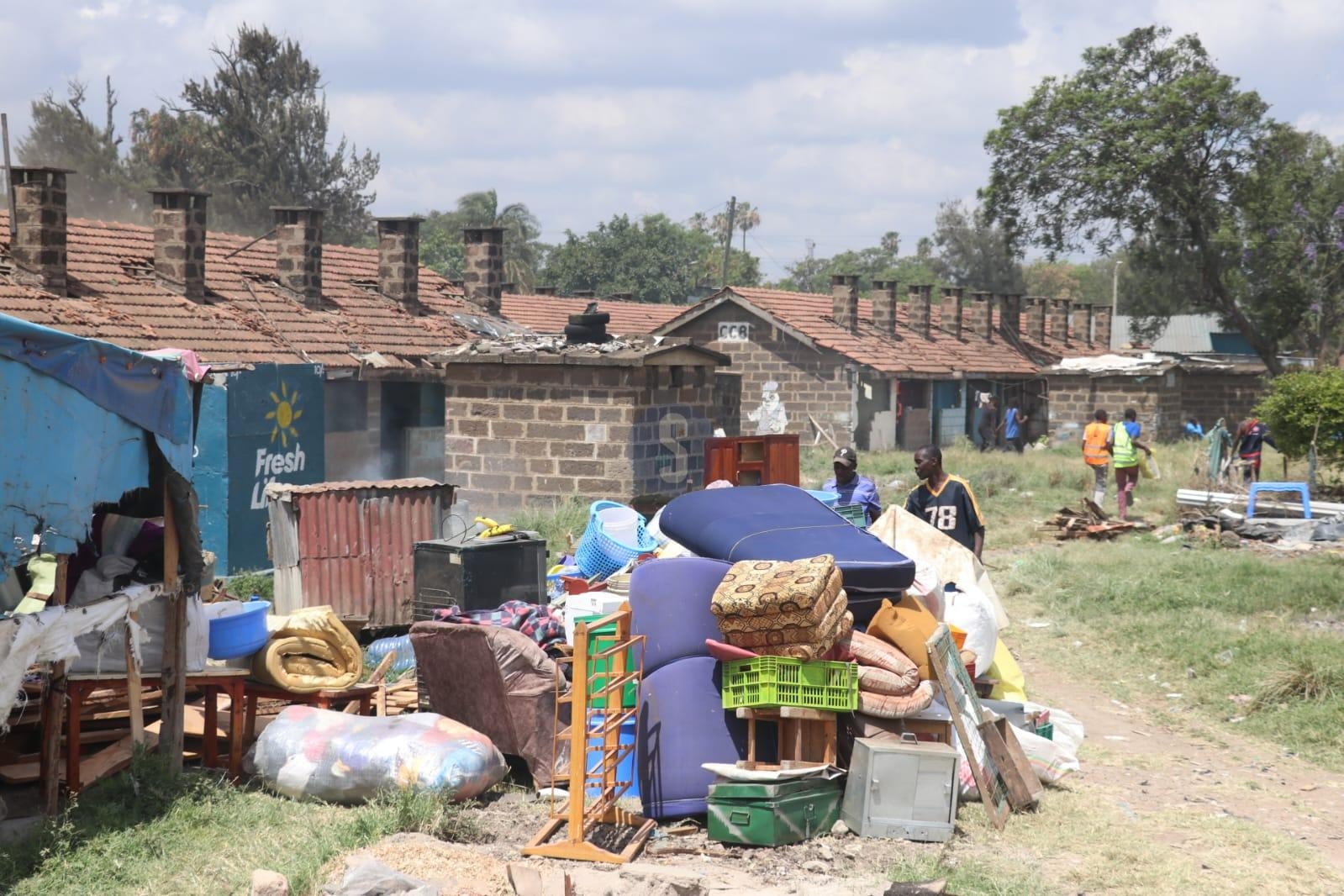Dorcas Adhiambo, 48, has been a midwife for 22 years in Kopere, a remote village in Kisumu county.
Known for her expertise in maternity delivery across the Nandi region and the Chemelil areas, Adhiambo was drawn to midwifery following personal experiences.
As cows moo in the background, Adhiambo narrates how doctors nearly took her to the mortuary only to wake up.
“I learnt this job through the Holy Spirit. When I was taken for surgery to give birth to my baby, I ‘died’ three times,” she says.
The scare and divine inspiration led her to become a helper for pregnant women.
According to National Population and development 2019, 6,300 women die each year during pregnancy or childbirth in Kenya.
The Midwifery Report 2021 says Kisumu is among the counties with the highest maternal mortality rate in Kenya, with 495 mothers dying for every 100,000 live births.
Midwives, called ‘Nyamurerwa’ in Luo, are widely consulted by expectant mothers for advice and delivery.
Adhiambo has enjoyed a long and successful career as a traditional untrained midwife and helped more than 100 women deliver their babies safely.
To her, midwifery is not something she intended to practise but a calling. She claims she received a call when she went into a coma. During this period, she was taught midwifery by a spirit like an angel.
“It happened so fast and even in church, I was told that it was my calling. I kept on denying this fact since I did not want to do it. But then I could not resist,” she says.
Even though Adhiambo may not be formally educated on midwifery and nursing, she has learnt through observation how to care for and support pregnant women.
She had to rush an HIV-positive mother who came to deliver at her house after she noticed she was unwell.
“One day, a woman who was HIV-positive came to give birth in my house but did not disclose her condition. However, I already knew about it by just looking at her. I delivered her and quickly stopped any transmission,” she says.
“They both survived and in fact, the baby is healthy up to now. She just thanked me later and apologised. However, what if it was not my calling? Without training, so many midwives would have caused deaths."
What if it was not my calling? Without training, so many midwives would have caused deaths
HOSPITALS OVERSTRETCHED
The unprecedented pressure on healthcare facilities in Kisumu during Covid had a ripple effect on access to healthcare for pregnant women.
“The 7pm curfew regulations brought challenges," Adhiambo says.
"Many pregnant women did not request letters that would give them the authorisation to go to hospital during curfew. And it is in the process that you could be easily arrested.”
Adhiambo says when a pregnant woman was about to give birth and they did not have permits, they could run and play cat and mouse with officers as they rushed to the nearest hospital.
But this could also cause problems for the pregnant woman.
“She might give birth before we even return since getting those letters was also not easy. So most of them really struggled,” she says.
The Covid-19 pandemic shone a light on the importance of investing in primary health care for meeting population health needs. Midwives are essential providers of primary health care and can play a major role.
Kisumu county director of health services Fredrick Oluoch says pregnant women were asked to get the curfew pass forms but most ignored the call.
“If they don't have the pass, they are being allowed to carry referral forms. This can help in record keeping and tracking the activities of the midwives within the villages,” he said.
But Adhiambo says even with the passes, some women preferred giving birth at home.
The area has about three midwives, who are inspired to provide support to pregnant women despite a lack of formal training on midwifery.
Kenya has only 2,092 midwives against the required number of at least 28,000 (UNFPA 2021).
“Sometimes you receive many women at a go and you are uncertain whether you will manage,” Adhiambo says as she sighs.
Most women who come to midwives like Adhiambo are not gainfully employed. Adhiambo is often compensated with food items rather than cash.
“Others will come basically with Sh50, Sh100 and the highest goes for Sh150. So you find most of them prefer home to the hospital, which goes for over Sh2,000,” she says.
At the hospitals, it will cost a pregnant woman over Sh5,000 for scanning and medications if a patient does not have insurance. Adhiambo says most of the women who visit her are not insured.
Adhiambo says that many midwives do not bother to put a price on pregnant women.
“When you help someone out of free will, you don't expect payment. So in most cases, you wait for them to see the good deed and pay you accordingly, whether to give you money or in kind,” she says.
I have done this midwifery for 57 years and in all those years, no one trained me
GOVERNMENT INTERVENTION
Adhiambo says apart from investing in training and capacity building for midwives, the government should reduce the fees for pregnant women to enable safe delivery in hospitals.
Kisumu county began an initiative to involve traditional birth attendants in interventions to curb maternal deaths.
It still has a long way to go, though.
Grace Akuku, 80, has not benefited from any government-funded capacity building programme. She says all they need from the government is to give them the necessary training skills.
“I have done this midwifery for 57 years and in all those years, no one trained me,” she says.
Akuku, who is seated in her home with partial blindness, says she never went to a school to learn how to help pregnant women.
“This midwifery runs in the family and I just learnt from watching my sister do it in hospital. That is how I started. It was hard initially but with time, you learn the ropes,” she says.
Akuku says she has been doing midwifery at the corner of her house.
“Can you see this wood up here? From that area to that corner, that is where I used to deliver pregnant women. I only stopped last year because of my eyes. Otherwise, I have delivered many babies,” she says as she points at the corner of her sitting room.
With her grandchildren stomping in and out of the house, Akuku recalls how before she was fully established, she saw a man running for help.
“I asked him where he was going, he told me that a woman was having labour pains and that the baby was stuck,” she says.
It is at this point that Akuku stopped her trip to the stream and instead rushed to the scene.
When she arrived, she found people surrounding the woman.
“They should have cut the placenta open to allow the baby to breathe but they were afraid. It is at that moment that I did my best to save the baby. From that day forward, everyone began trusting me,” she says.
With trust and the urge to help, Akuku helped women deliver safely and only recorded two deaths.
Akuku charges between Sh100 and Sh500, but like Adhiambo, women who come to her cannot afford medical fees. In fact, she often ends up providing food and financial support to needy expectant mothers.
“When someone gives birth, you have to give them food. In my case, I would buy milk and give it to the mother. This will also help in monitoring her as she rests before leaving,” she says.
“Most people come to me because it's cheaper than the hospitals and also it's a nearer place. It's also a safe space to negotiate with me, unlike hospitals, where you cannot negotiate. You will have to pay.”
Having practised for a long time, she would rush a mother to the hospital if she knew the pregnancy would be complicated.
“If I know it's an ectopic pregnancy, I would refuse to handle the case, I take her to the hospital with my money. It's easier to know when you touch the belly of the woman. I had no tools whatsoever, so in such a case, I try not to deliver the baby,” she says.
SOOTHING TOUCH
With Adiambo and Akuku saying how passionate they love their job even without having the necessary capacity, Mercy Achieng, 21, says a midwife's touch gives her comfort.
“Mostly, we go to Adhiambo because she will not charge you. When you explain your situation, she will safely help you, unlike hospitals, whereby you can’t tell a doctor you don't have medical cover or money to give,” Achieng says.
She delivered her two babies through the help of the midwife.
“Every time I realise I am pregnant, I first see a midwife because there is a way in which she touches you unlike the hospitals, where they put some equipment on your belly,” she says.
She says being in the village also makes many people prefer midwives rather than hospitals.
“When I first got married here, I was introduced to Adhiambo. She was the first person I went to when I realised I was pregnant,” she says.
Achieng says whenever she does not see the midwife, she doesn't feel okay when pregnant.
Every time I realise that I am pregnant, I first see a midwife because there is a way in which she touches you unlike the hospitals, where they put some equipment on your belly
“When I don't see her even after one week, I don't feel really okay. She takes oil and massages my belly properly until the pain you had goes away,” the mother says.
Achieng says all the midwives need is training.
“There was a time I went to see my midwife and she transferred me to the hospital,” she says.
“I had a condition that I would not like to disclose, but she asked me to seek help. So preferably, I think with necessary training and capacity building, they can also do it.”
Achieng, who is married, says during her pregnancy, the only thing that she gave the midwife was kales from the garden.
“We go there because we need help and we don't have the money. Also, the hospitals are far away, and the midwives are closer,” she says.
Smiling and washing her daughter in a stream nearby, Achieng says the government should partner with midwives and train them.
“Let the midwives be given emergency tools that they can help out with when an emergency arises. They should also be given a directive that they should not help women to deliver in the house; they should take them to the hospitals,” she says.
WAY OUT
The World Midwifery Report 2021 notes that increased investment in midwives could save up to 4.3 million lives a year.
Oluoch says they have a plan for the traditional birth attendants.
“In future, we want to engage midwives in useful things like in the continuous mapping of pregnant women and also to train them by urging them to transfer clients,” he says.
Midwives are at the core of universal health coverage, serving as primary health workers during women’s pregnancy, labor, delivery and the neonatal period.
According to a White Ribbon Alliance report 2021, it is important to equip midwives in the peripheral rural facilities with adequate space, equipment and drugs to conduct safe deliveries.
“It is also important that midwives are backed up with a functional referral system with ready to use ambulances and proper referral protocols and procedures. Doing so is to honor the wish of midwives to deliver professional, quality and respectful care to women,” it read.













